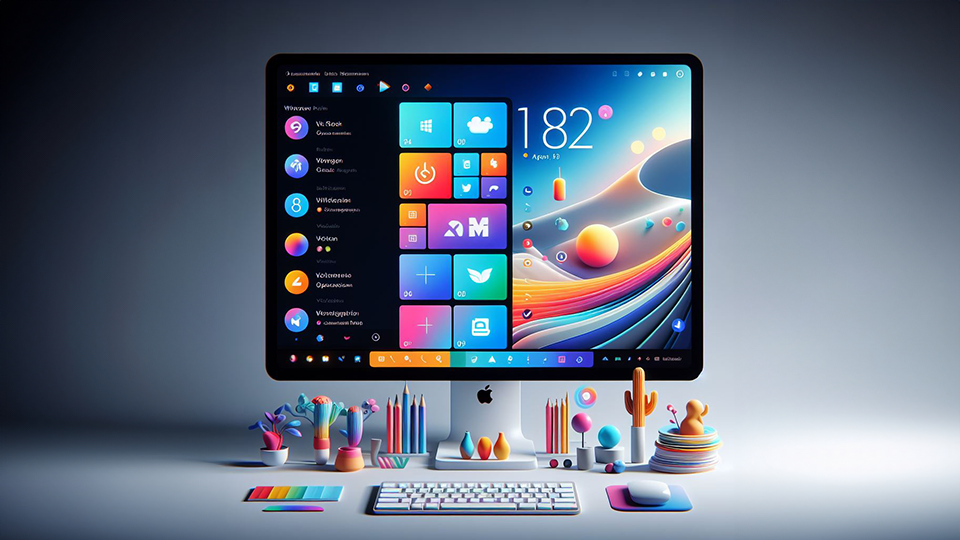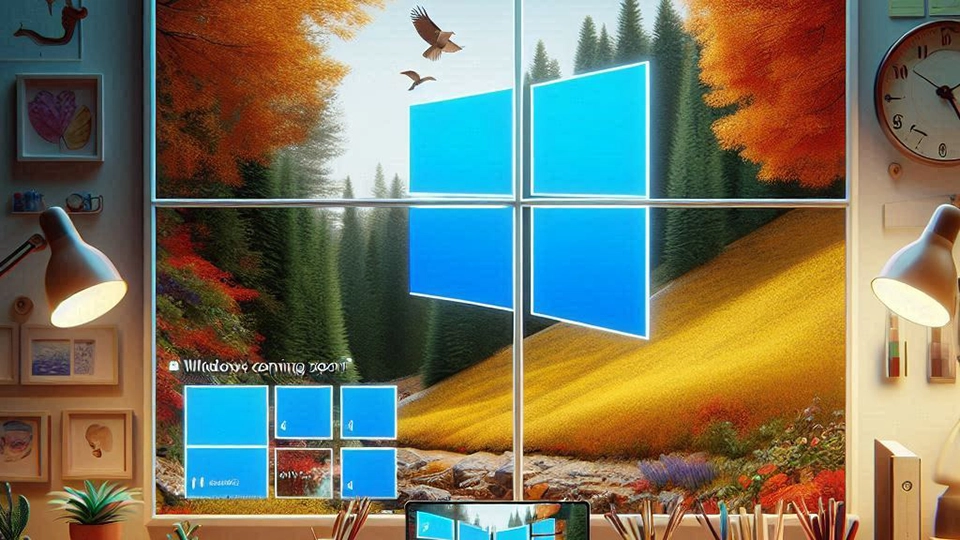Windows March 2, 2024
Windows 12: Anticipating the Next Evolution of Windows

Rumors swirl around Microsoft's potential development of Windows 12, spurred by a leak from Intel and the emergence of a new Windows Insider channel promising cutting-edge OS versions. While Windows 11 is still in its infancy, whispers suggest that Windows 12 could grace our screens as early as 2024. Though Microsoft remains tight-lipped, it's never too early to dream up our ideal features for the next major Windows release.
Setting the Stage for Windows 12
A Defined Release Date
Windows 11's gradual rollout left many users eagerly waiting for their turn to experience the new OS. With Windows 12, we hope for a more decisive launch strategy. A simultaneous release for all users, supported by Microsoft's service model, would inject confidence and excitement into the Windows ecosystem.
Yet, while we yearn for this streamlined approach, Microsoft's insider program remains pivotal. By allowing registered users to test upcoming features, Microsoft ensures a smoother transition for all. Still, a clearer timeline for Windows 12's release would ease anticipation and offer users a glimpse into the future of their computing experience.
Speculation abounds regarding Windows 12's launch, with reports hinting at a potential 2024 release. However, amidst discussions of forthcoming Microsoft hardware like the Surface Laptop Studio 2 and Surface Pro 10, Windows 12's arrival remains shrouded in mystery.
Pursuing Compatibility and Accessibility
Embracing Broad Compatibility
Windows 11's stringent hardware requirements, particularly the need for a Trusted Platform Module (TPM) and specific CPU configurations, initially sparked controversy. While Microsoft aimed to bolster security standards across the ecosystem, many users found themselves sidelined by the stringent prerequisites.
However, Microsoft has since navigated these challenges, witnessing a surge in Windows 11 adoption, particularly among PC gamers. Looking ahead to Windows 12, maintaining compatibility with existing systems should be a priority. Transitioning to the new OS should be seamless, especially for users with custom-built PCs who may face additional hurdles.
While security remains paramount, Microsoft should approach any potential hardware requirements with caution. The persistent watermark issue plaguing Windows 11 installations highlights the need for a smoother upgrade experience. Users should not be deterred by false indicators of incompatibility, especially when their systems meet the necessary criteria.
As Microsoft charts the course for Windows 12, prioritizing accessibility and user experience will be key to fostering widespread adoption and satisfaction.
Ensuring Continuity and Accessibility
Seamless Transition and Cost Considerations
A critical aspect of the Windows ecosystem's evolution is the seamless transition between operating system versions. Windows 11 users, especially those migrating from Windows 10, anticipate a smooth upgrade path to Windows 12. Maintaining continuity in this regard is paramount to user satisfaction and the overall ecosystem's health.
Microsoft's historical stance on upgrades, particularly offering free transitions for licensed Windows users, has been instrumental in fostering widespread adoption. As Windows has evolved into a service-driven platform, the company's ability to monetize through data collection and targeted advertising has become increasingly apparent. Despite privacy concerns, this model has facilitated accessible updates for users without the financial burden of traditional upgrade costs.
For Windows 12, the expectation for a free upgrade from Windows 11 remains strong. This continuity not only aligns with Microsoft's established practices but also reflects the evolving nature of software distribution and service-oriented business models. By maintaining this approach, Microsoft can uphold user trust and ensure that the latest innovations are accessible to all users, regardless of their financial circumstances.
As Windows 12 takes shape, prioritizing user accessibility and affordability will be instrumental in shaping the platform's success and its ability to meet the diverse needs of its global user base.
Embracing the Power of AI: Transforming Windows 12
Integration of AI Across the OS
Microsoft's strategic investment in AI, particularly through its collaboration with OpenAI, has been instrumental in driving innovation across its product ecosystem. From enhancing search capabilities in Bing to incorporating AI-driven features in Skype and Teams, the influence of AI is pervasive and transformative.
In envisioning Windows 12, a key aspiration is to witness AI's pervasive integration throughout the operating system. While Windows 11 has already introduced AI-powered functionalities such as voice typing and background enhancement in Teams, the potential for AI-driven enhancements across various facets of Windows 12 is immense.
Productivity stands as a prime arena for AI intervention within Windows 12. Imagine AI-driven Focus Sessions that adapt dynamically to user behaviors, notifications tailored to individual preferences, and Widgets offering personalized insights based on usage patterns. By leveraging AI in these areas, Windows 12 can redefine productivity experiences, empowering users to achieve more in their digital endeavors.
However, the scope of AI's influence within Windows 12 extends beyond productivity enhancements. From optimizing system performance to refining user interactions, the integration of AI holds promise in elevating the overall user experience.
As Microsoft continues to harness the capabilities of AI, Windows 12 emerges as a platform poised to redefine the boundaries of innovation and user-centric computing. Through seamless AI integration, Windows 12 endeavors to anticipate user needs, streamline workflows, and foster a more intuitive and productive computing environment.
The journey toward Windows 12 represents a pivotal moment in the evolution of Microsoft's operating system, where the convergence of AI and user-centric design principles heralds a new era of computing excellence.
Unleashing Personalization: Windows 12 Redefined

A New Era of Customization
Windows 11 marked a significant aesthetic overhaul, introducing rounded corners, a centered taskbar, and updated icons, giving the OS a distinctly modern feel. However, this evolution came at the cost of some of the deep customization options that Windows users have come to cherish.
Looking ahead to Windows 12, the call is for a resurgence of customization options, providing users with unprecedented control over their computing environment. While third-party tools currently offer the ability to revert Windows 11 to a more familiar Windows 10 appearance, Windows 12 seeks to seamlessly integrate these features into the core OS.
Deeper Taskbar Customization:
One of the anticipated highlights of Windows 12 is an expanded range of options for the taskbar. Users aspire to move the taskbar to different sides of the screen, tailoring its placement to individual preferences. This heightened flexibility ensures that users can create a desktop experience that aligns seamlessly with their workflow and ergonomic preferences.
Versatile Start Menu Styles:
The Start menu, a focal point of user interaction, should be a canvas for personal expression. Windows 12 aims to deliver varied Start menu styles, allowing users to choose layouts that resonate with their aesthetic sensibilities and optimize accessibility.
Empowering Users with Choice:
Disabling features like widgets, another area of interest, reflects the commitment to empowering users with choice. While widgets can enhance the desktop experience for some, others may prefer a more streamlined interface. Windows 12 ensures that users can curate their experience based on their preferences and workflow requirements.
In essence, Windows 12 aspires to combine the visual modernity introduced by Windows 11 with the unparalleled customization options that define the Windows legacy. By offering a harmonious blend of innovation and user empowerment, Windows 12 charts a course toward a more personalized and user-centric future.
As the journey toward Windows 12 unfolds, the vision is clear – a dynamic, customizable, and intuitive operating system that not only meets but exceeds user expectations.
The Future of Windows: Defined by You
Fostering Innovation Through AI Integration
Windows 12 is poised to harness the power of artificial intelligence (AI) to revolutionize user experiences across the platform. Microsoft's substantial investment in OpenAI underscores its commitment to infusing AI capabilities into every facet of the operating system.
Expansive AI Applications:
In Windows 12, AI integration extends beyond mere novelty. While Windows 11 introduced AI-driven features like voice typing and enhanced background effects in Teams, Windows 12 seeks to expand AI's reach across all user interactions. From intuitive notifications to dynamic widgets, AI will anticipate user needs and adapt to individual usage patterns seamlessly.
Productivity Redefined:
A key focus area for AI integration lies in productivity enhancement. By leveraging AI insights, Windows 12 aims to elevate Focus Sessions, refine notifications, and curate Widgets to deliver timely, relevant information. This proactive approach to productivity empowers users to optimize their workflow and achieve peak efficiency effortlessly.
Evolution of Security and Compatibility
Building upon the foundation laid by Windows 11, Windows 12 endeavors to strike a delicate balance between enhanced security measures and broad compatibility.
Streamlined Security Protocols:
Recognizing the importance of security without compromising user accessibility, Windows 12 aims to refine security protocols established in Windows 11. While maintaining stringent standards, Microsoft endeavors to minimize barriers to upgrading, particularly for custom-built PC configurations.
Continued Compatibility:
Windows 12 reaffirms Microsoft's commitment to ensuring broad compatibility across diverse hardware configurations. Addressing concerns raised by the TPM requirements in Windows 11, Windows 12 aims to facilitate seamless transitions for users, minimizing disruptions and optimizing compatibility across a spectrum of devices.
Conclusion: Shaping the Future of Computing
In summary, Windows 12 represents a pivotal milestone in the evolution of Microsoft's flagship operating system. With a renewed emphasis on customization, AI-driven innovation, and security-conscious design, Windows 12 is poised to redefine the computing experience for users worldwide.
As Microsoft continues to unveil its vision for Windows 12, the emphasis remains squarely on user-centric design, empowering individuals to tailor their computing environments to their unique preferences and requirements.
In the dynamic landscape of modern computing, Windows 12 stands as a testament to Microsoft's unwavering commitment to innovation, security, and user empowerment.
Share
Latest article
- HBO Pulls the Plug on ‘The Franchise’ After Just One Season
- OnePlus’s New Flagship Killer: The OnePlus 13R Revealed!
- OpenAI’s Latest Move: ChatGPT’s Web Search Engine Goes Live
- Life is Strange: Double Exposure Review – Max Caulfield’s Triumphant Return
- Astro Bot: The Game That Makes Owning a PS5 Worth It
Categories
- AI
- AR-VR Headsets
- Baby
- Cloud Storages
- Earbuds & Headphones
- Games
- Gaming Laptops
- Others
- GPUs
- Leaks
- Mobile
- Windows
Topics
Apple Apple Vision Apple Vision Pro Apps AR AR-VR Astro Bot Asus ROG audio baby monitors baby monitor comparison baby monitor reviews baby monitors Babysense MaxView review best baby monitor features best baby monitors Black Myth: Wukong Bluetooth Cache Reset ChatGPT Cloud Cloud Storage contact us Cookie Policy Cross-Platform Drive EA Entertainment External Display Face ID Family Share Fold 5 Fold 6 Foldable Phones Galaxy A35 Galaxy A55 Galaxy Z Fold Game Reviews Games Gaming Gaming Laptop Google Google Drive Google Mobile Phones Google One Google Pixel Google Pixel 9 GPU GPU Review HBO Headphones high-definition baby monitors Honor Honor Magic V2 iPhone Leaks Life is Strange Life is Strange: Double Exposure local video baby monitors long battery life baby monitors Microsoft Microsoft Windows Mobile Mobile Phones Mobile Reviews Multi Connection Multipoint Nanit Pro baby monitor NVIDIA NVIDIA RTX 4070 OnePlus OpenAI Optic ID Phones Privacy Policy Productivity Project Rene PS5 Games Registry Editor Release Date Reviews RPG Games Rumors Samsung Samsung Z Fold Sea Of Thieves SearchGPT secure baby monitors Storage Spaca Strategy Games Strategy RPG Summer Gaming Marathon Tech News The Sims 5 Top 10 Apps top baby monitors Troubleshooting TV Series Unicorn Overlord video baby monitors VR VR Headsets VTech baby monitors Wi-Fi baby monitors Windows Windows 10 Windows 11 Windows 11 24H2 Windows 12 Windows Guides Z Fold 5 Zephyrus G14Related Posts

User Pulse Hub

